|
Space Coast Regional Warbird
Airshow (Tico), Titusville, Space Coast Regional Warbird
Airshow (Tico), Titusville, FL
Seymour-Johnson AFB,
Goldsboro, NC
MCAS Beaufort,
Beaufort, SC
TBM Reunion, Peru, IL
Gathering of Warbirds,
Waukesha, WI Spirit of St.
Louis Airshow, Chesterfield, MO
2019 Airshows
MCAS Beaufort Warbird
Photo Review
Warbirds at the MCAS Beaufort,
Beaufort, SC Airshow 2019 -
April 27-28, 2019 - Photos taken
Sunday, April 28, 2019.
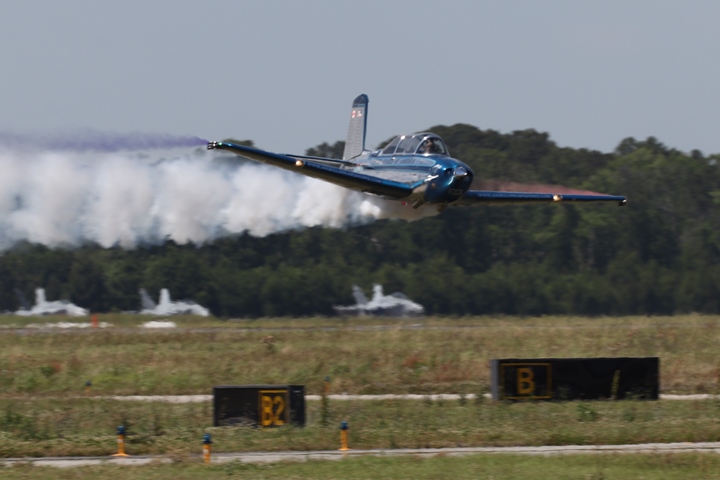
At airshows, I often see an aircraft or
a routine for the first time. In this case, it was the last time.
Julie Clark is on her farewell tour after 32 years flying airshows in her T-34.
The airshow circuit is going to miss her.
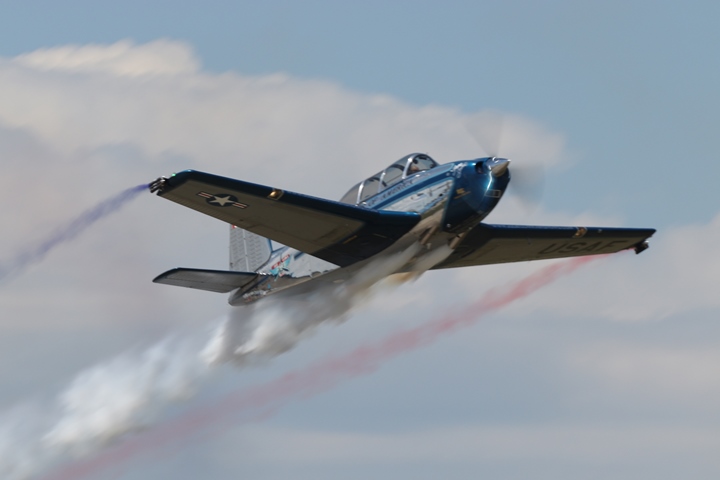
If nothing else, the long trip down to MCAS
Beaufort to see Julie fly one last time made the trip well worth it.
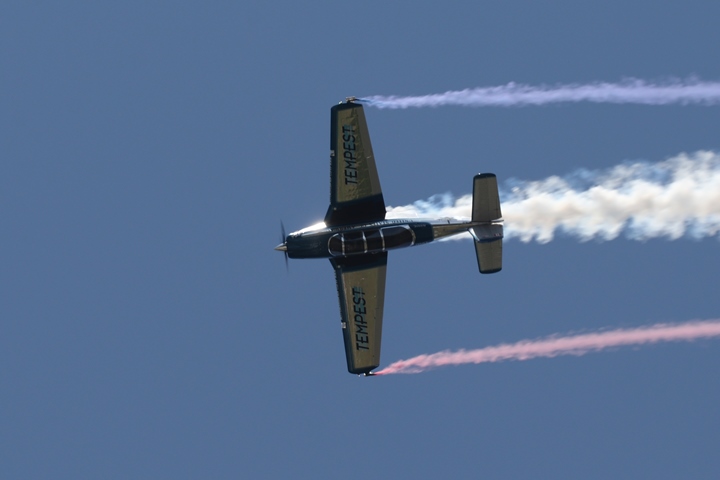
To my knowledge, Julie is the only T-34
aerobatic act on the airshow circuit. Her retirement is going to
leave a big gap for this type aircraft.
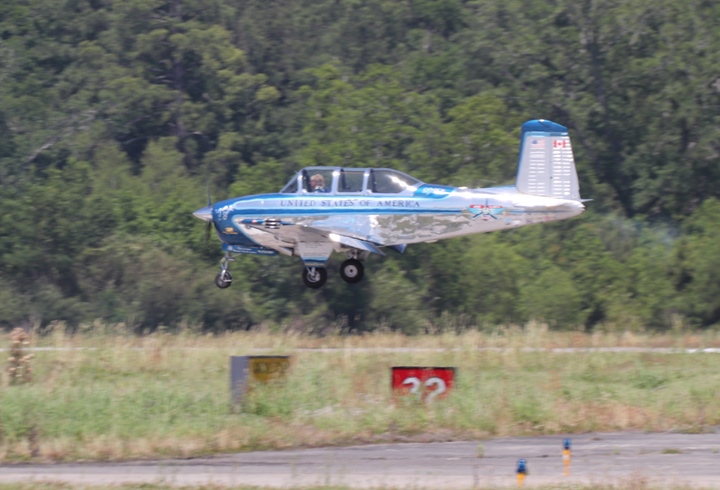
In the 32 years Julie has been flying the
T-34,
innumerable airshow acts have come and gone. While there are
probably a handful of performers around as long as her, normally they
don't fly the same aircraft throughout their airshow careers.
She probably has sets a record for the most longevity in one aircraft.
Good luck to Julie on her future endeavors!
MCAS Beaufort, located in Beaufort, SC,
hosts an airshow every other year, alternating with the other Marine Air
Station on the east coast, Cherry Point. While I have been to MCAS
Cherry Point several times, this was my first visit to MCAS Beaufort.
It hasn't been for lack of trying. Every December, when the dates
of the following years airshow's are posted, MCAS Beaufort would go on
my list of shows to visit. But every year something would
interfere with my attending. For 2019, the situation worked out
perfectly. It was the same weekend as the Seymour-Johnson Wings
over Wayne show, which was just a few hours' drive from MCAS Beaufort.
This made for a good double-header military airshow weekend.
MCAS Beaufort is a typical Marine airshow
with demonstrations by the AV-8B, F-35B, and Marine Air-Ground Task
Force (MAGTF) demonstration. These were part of a larger line-up
that included the US Navy Blue Angels, the F-22 Demo, and several
warbird and civilian aerobatic routines. The set-up of the crowd
line was unusual and unique, as shown below.
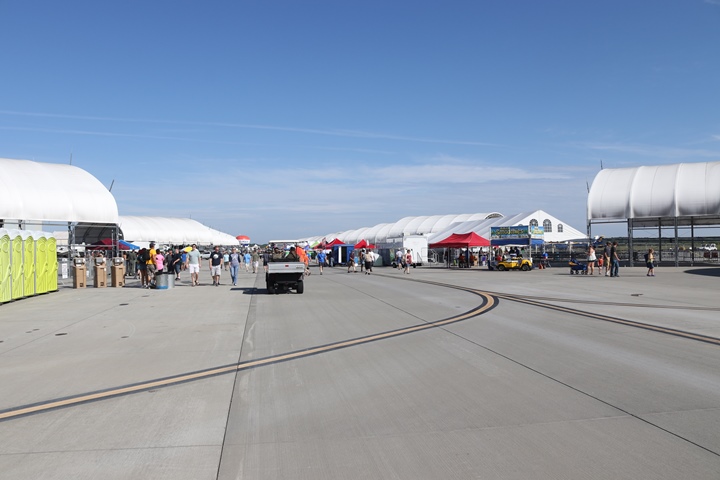
The airshow took place on this ramp.
Located on the ramp are the semi-permanent weather shelters for the
F-35Bs at the base. The group of shelters to the right are butted
right up to the crowd line. The shelters to the right and in the
background are the location of the chalets for paid seating and VIPs.
There were four shelters, starting with the one at the far right of the
photo for free seating. There are obviously some drawbacks to
this. If located in the shelter, viewing of aircraft maneuvering
behind and above the shelters is restricted for those inside. For
those in the crowd that watch the show from the open area of the ramp
between the rows of shelters, low level viewing of aircraft is
restricted. However, there is an advantage to being inside a
shelter, which is protection from the sun. I was in the shade
after 1:30PM.
Located in the shelters in the left of the
photo were F-35Bs.
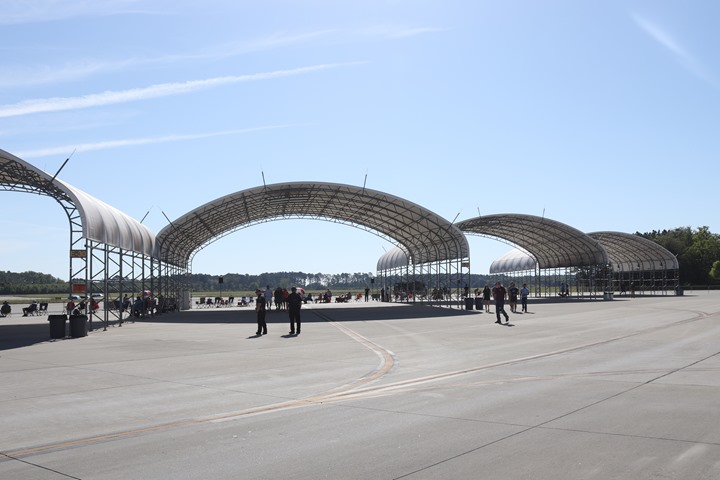
This is looking towards the runway and into
the back into the last four shelters at the right end of the crowd line.
Chairs have been set up along the crowd line by the early arrivers at
the show.
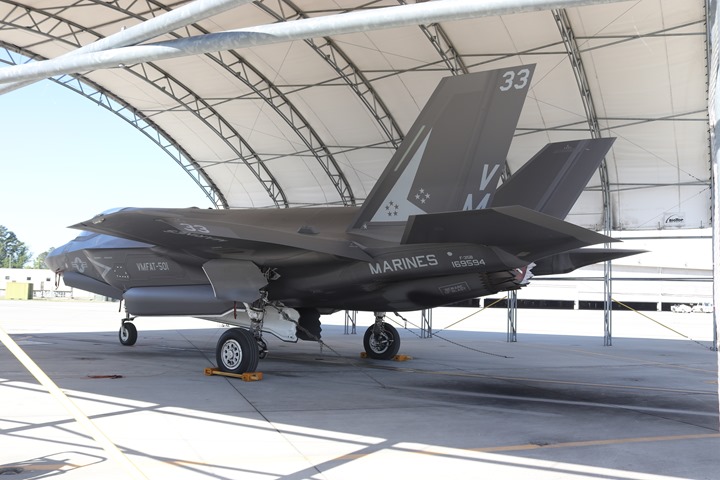
There were six F-35Bs located in their
shelters. This one would later fly the demo.
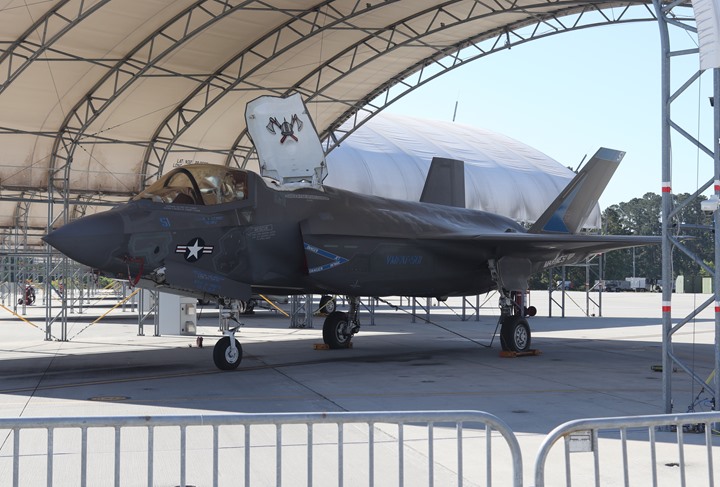
This was is specially marked in color.
Note the stars and bars in red, white and blue.
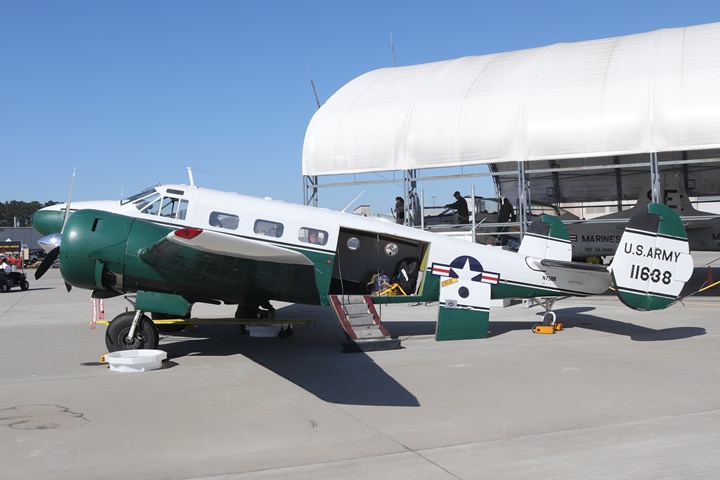
This C-45 was new to me. It was built
by Beechcraft in 1951. According to the person with the aircraft,
this was an Army general's aircraft in Korea.
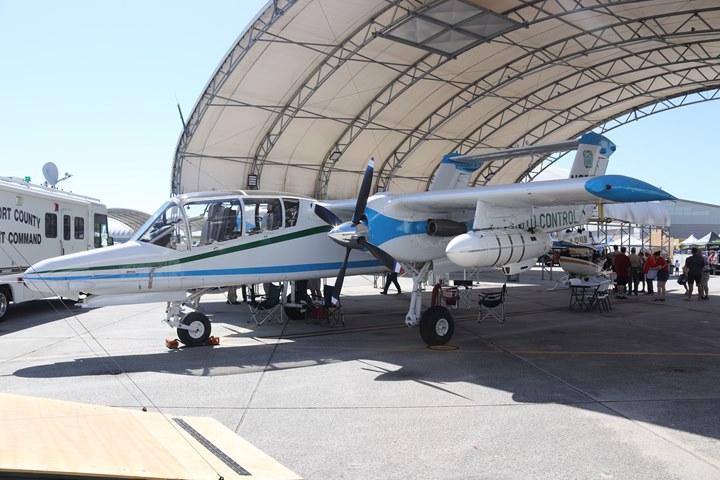
This OV-10D Bronco is owned by Beaufort
County, SC, and is used for mosquito control. In talking with the
pilots, this was one of the OV-10Ds that was operated out of Patrick
AFB, FL by the US State Dept. They were used for spraying drug
crops in Columbia, South America until 2010, when they were phased out.
Several of the Broncos ended up at Cal-Fire in CA. One is on
display at the Tico Warbird Museum in FL.
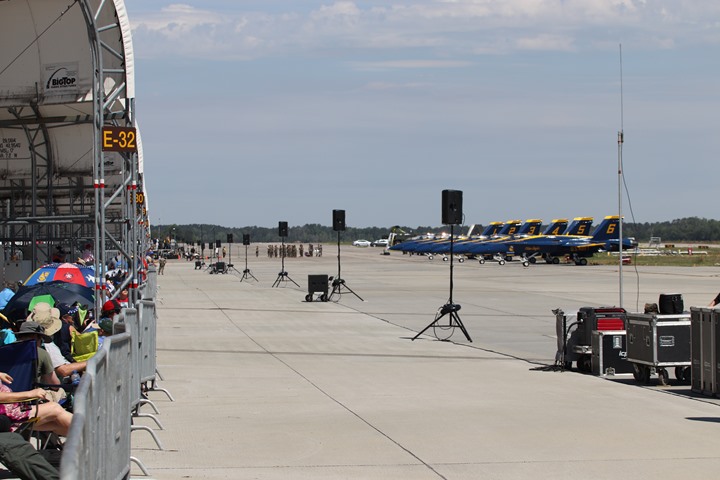
Air show clutter! Speakers and a radio
antenna block clear shots. Originally, I was set up in front of
the antenna, but while that put me closer to airshow center, it blocked
my straight-ahead view. The Marine Corps band from Parris Island
can be seen at airshow center playing Sousa marches. For the flag
jump, it would play the National Anthem.
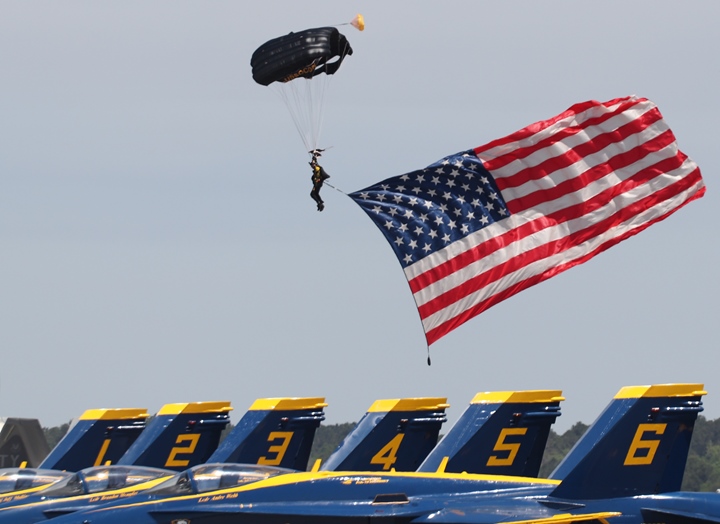
The U.S. flag was brought down by a member
of the Para-Commandos of the U.S. Special Operations Command.
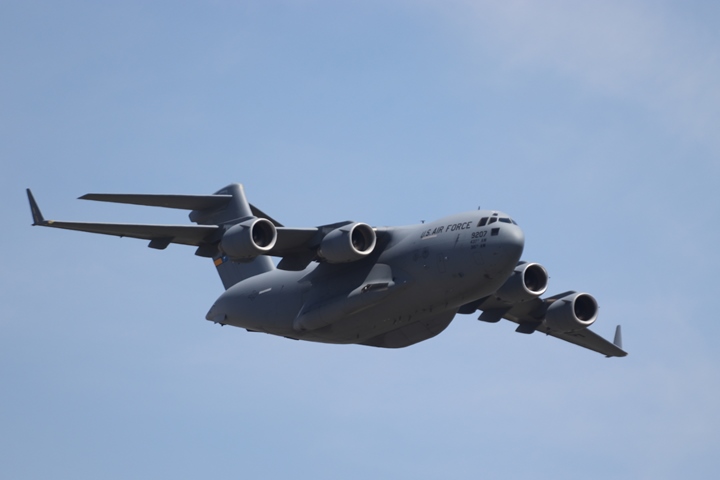
This was the second of two C-17 demos I
witnessed at two different shows over the weekend.
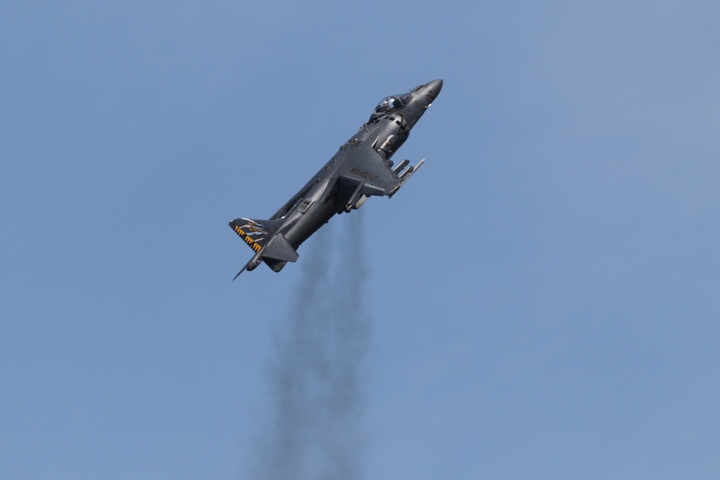
The AV-8B Harrier is still around, for a
while at least. It is still excellent in turning jet fuel into
noise. Here it is climbing out from a hover.
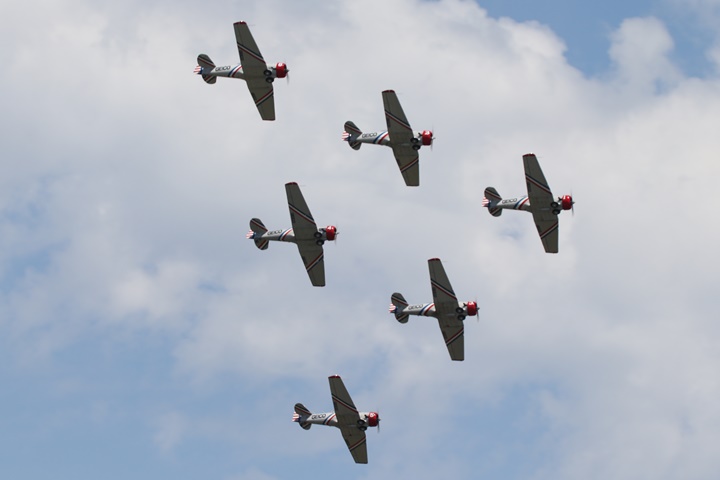
The Geico Skytypers performed its formation
routine for the crowd.
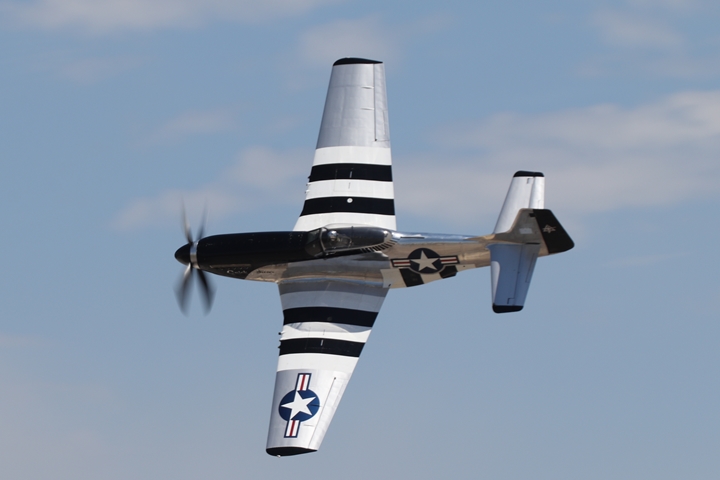
Scott Youk was in attendance and did his
normal excellent aerobatic routine in his P-51 Mustang.
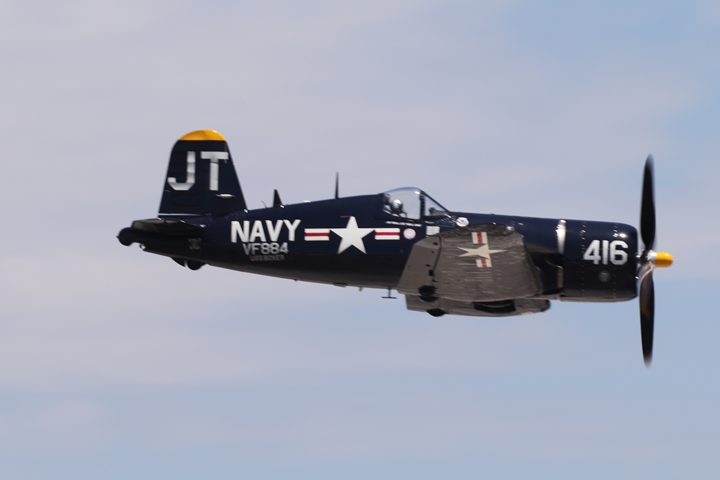
Jim Tobul is from nearby Bamberg, SC, and
performed his aerobatic routine in the F4U-4 Corsair.
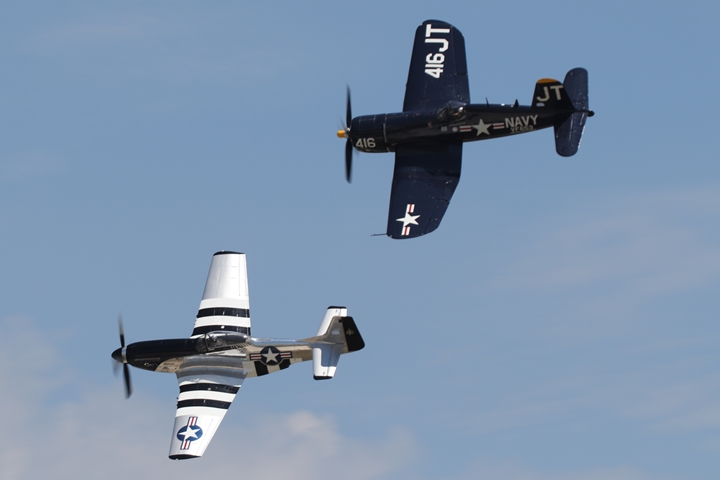
Then the two aircraft got together for their
Class of 45 demonstration.
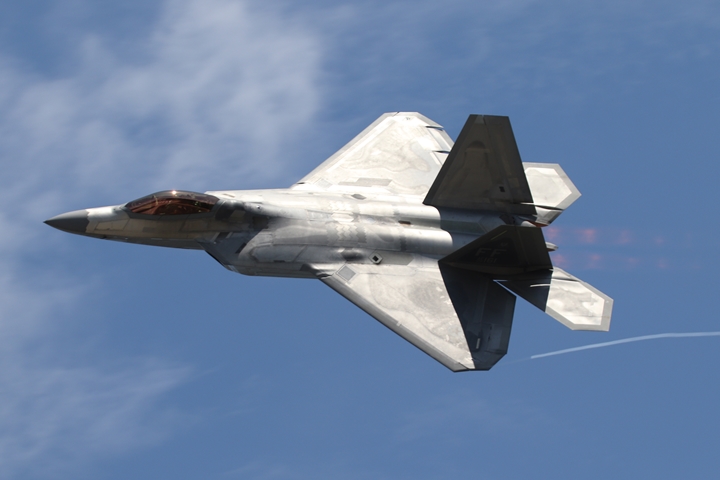
The F-22 is very impressive. While the F-35A
demonstration I viewed the day before at Seymour-Johnson AFB was good,
and the F-35B that flew later in the day at this show was good, neither,
in my opinion, put on as good a demonstration as the Raptor. While
the F-35s are new, and no doubt have more advanced electronic systems
capability than the F-22, the F-22 Raptor puts on a better show.
It figuratively blew our socks off!
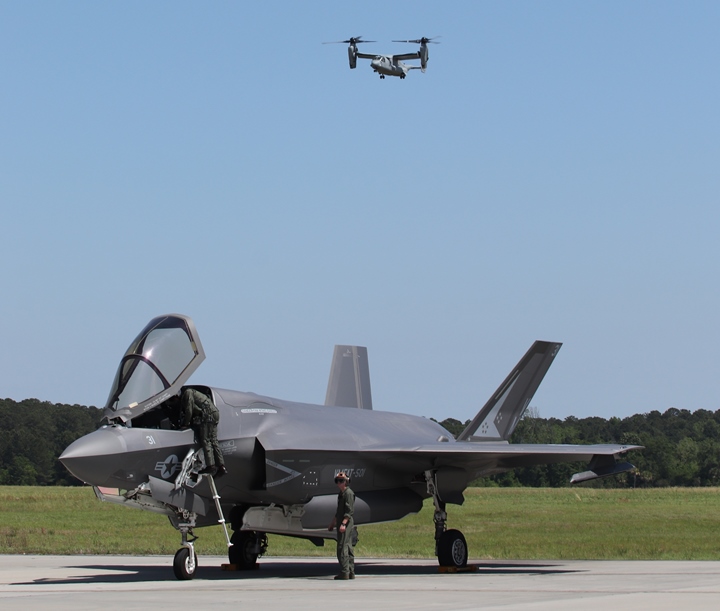
Next up was the MAGTF demonstration with
several F-18s from the base, a MV-22 and a CH-53. There were no
ground troops used in the demo. Here the MV-22 comes in during its
part of the routine, as the F-35B gets ready for its demo. One of
the advantages of being down in the "cheap seats" at far right of the
crowd line is that we were able to watch the start-up of the demo
aircraft.
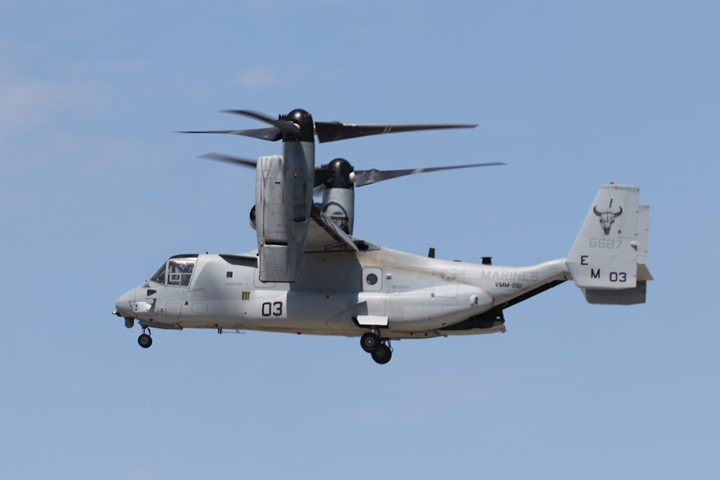
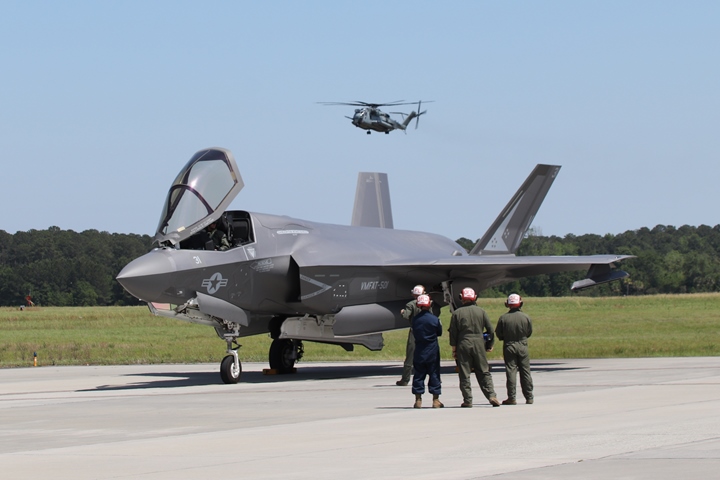
Next in was the CH-53.
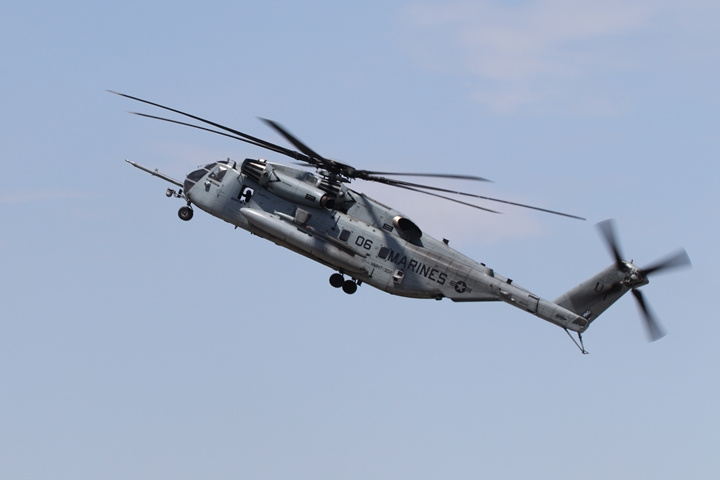
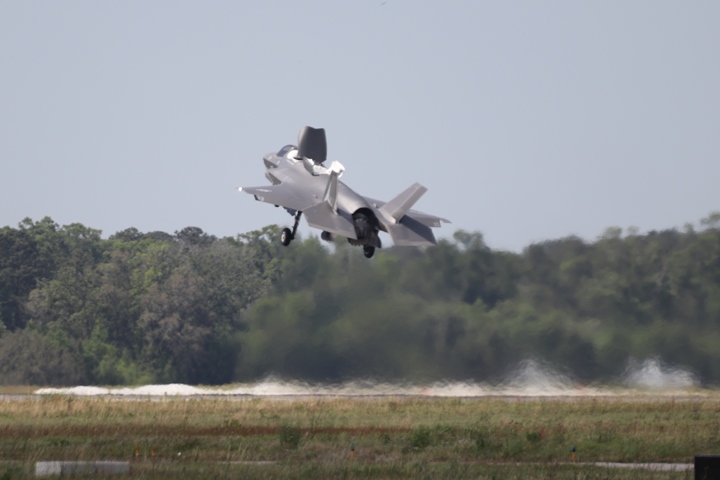
The F-35B did a short field take off.
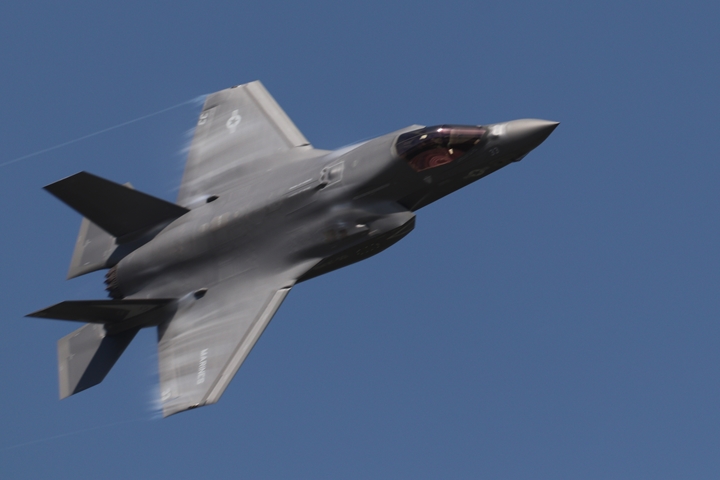
The F-35B can also go really fast!
When the F-35B demonstration was complete, I
left the show, as the only act left was the Blue Angels. I had
seen what I came to see, and waiting to leave after the Blues fly can
make for a really long wait trying to get off base. When I arrived
early Sunday morning, I asked the Marines who did my security check, how
long it took to get traffic out Saturday. They told me it wasn't
that the base was not cleared of vehicles until after 8PM.
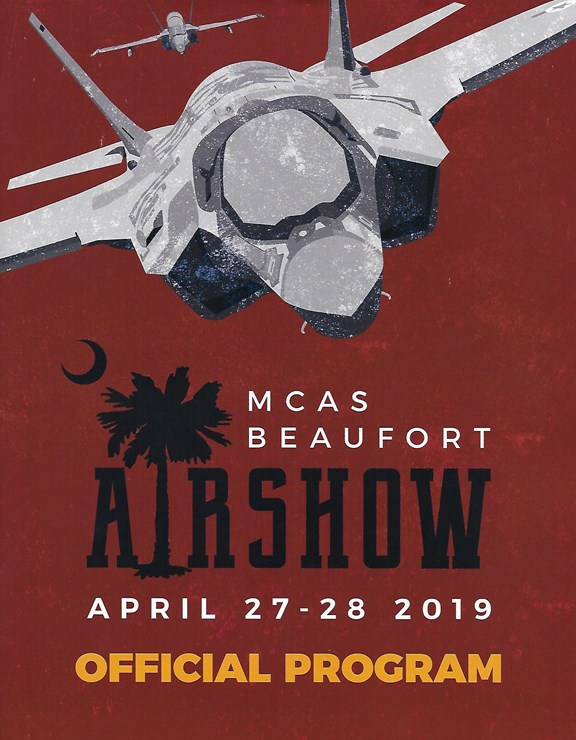
Side Trips: Actually,
"Side Trips" is not the proper title for this section, as shown here are
places I visited en-route to the final destination of the airshow at
MCAS Beaufort on Sunday. Without these stops along the way, it
might not make as much sense to travel the distances involved to go
watch airplanes fly. But it is not the destination, but the
journey along the way that makes for a complete trip.
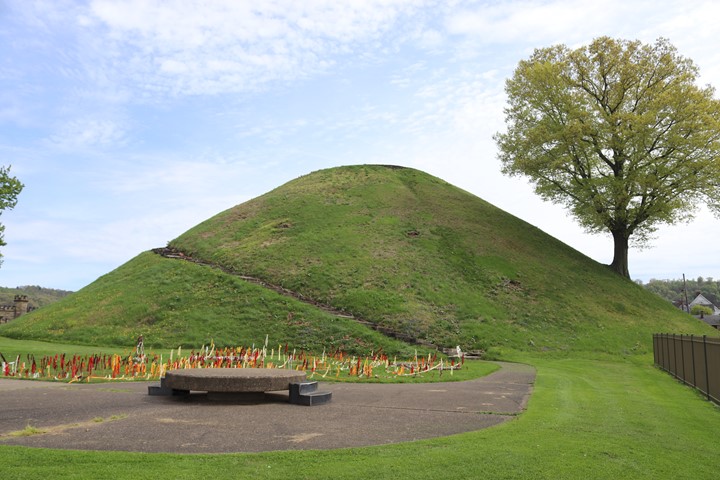
Located in Moundsville, WV Grave
Creek Mounds is an Adena era burial mound that is over 2,000 years old.
It is 60 feet high, 240 feet in diameter, and filled with 60,000 tons of
dirt. This location is only 20 minutes south of I-70 in Wheeling,
WV. Numerous times, I have gone through Wheeling in a hurry to get
somewhere, or to go home after a trip. For this trip, Moundsville
was planned as my first stop.
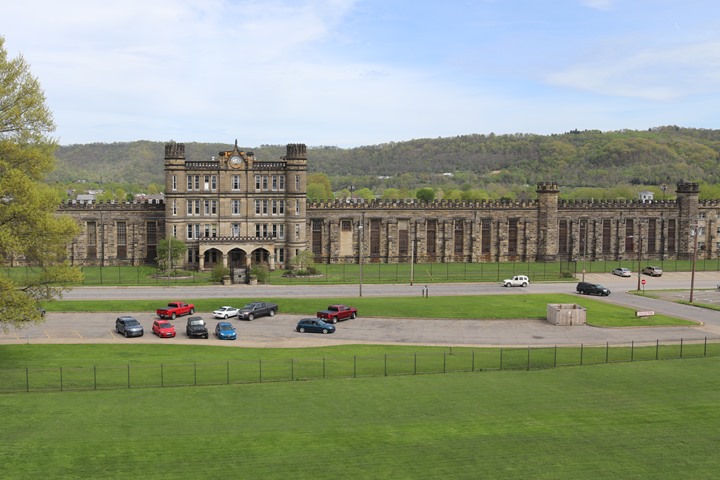
From the top of the Grave Creek
Mound, the former WV State Penitentiary can be seen across the street.
It has a foreboding and gothic appearance. Like several other
former prisons around the country, it is a historical site, and a
tourist attraction.
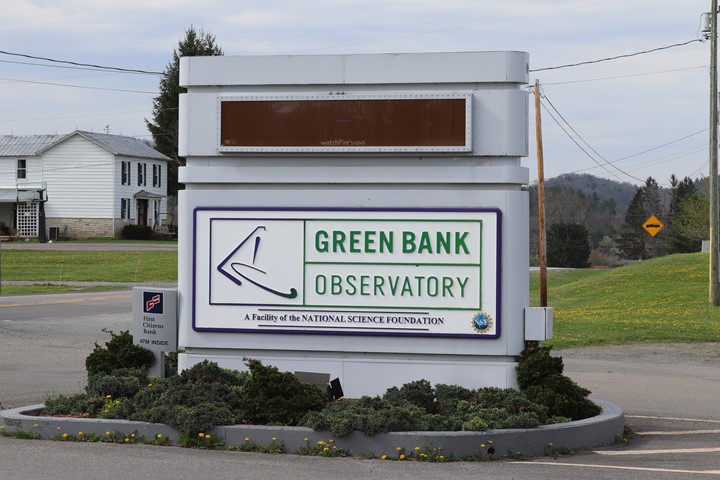
The Green Bank Observatory in
Green Bank, WV is located in a valley with mountains surrounding it to
keep earth-generated radio waves from interfering with the radio waves
the Green Bank Telescope is receiving from the universe. By West
Virginia law, cell phones, wireless, and microwaves are not allowed in
the valley. If spurious radio waves are detected, a truck is
dispatched to find the location of the offending problem, so that it can
be removed. This was the one place I really wanted to visit
besides the airshows. Due to the fact that Green Bank is in the
middle of nowhere, much of my trip was planned around a visit here.
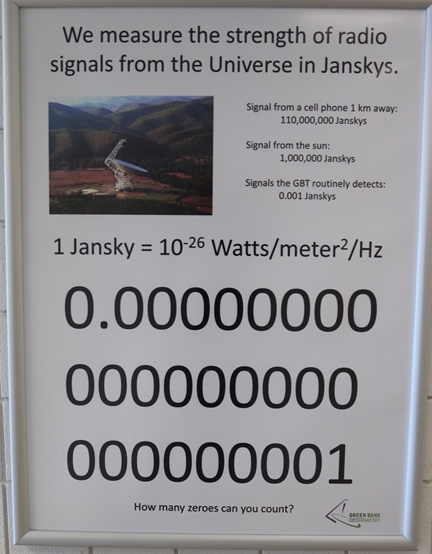
No matter what units one uses, it
can be seen that the detected radio waves detected by the Green Bank
Telescope are considerably smaller than a cell phone call.
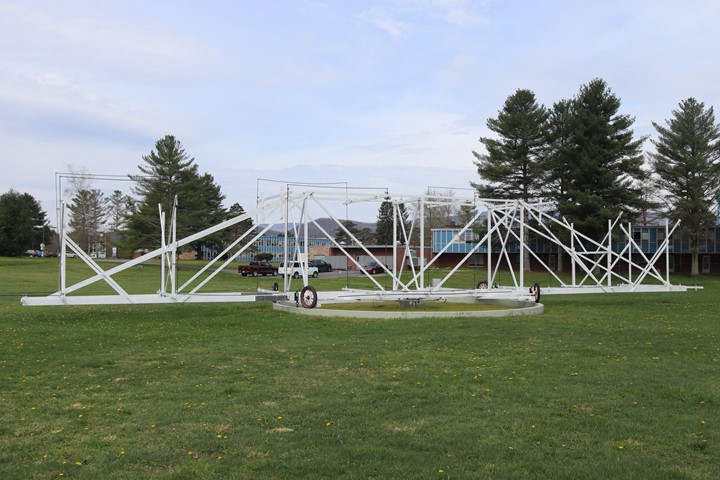
Why do the radio astronomers
measure in Janskys? Because in 1932 Karl Jansky, while working for
Bell Labs, built an antenna like this one to find where the interference
was coming from during long distance call using high frequency radio
waves. In the process, he discovered radio waves from the
universe. This is a replica of the original antenna he used.
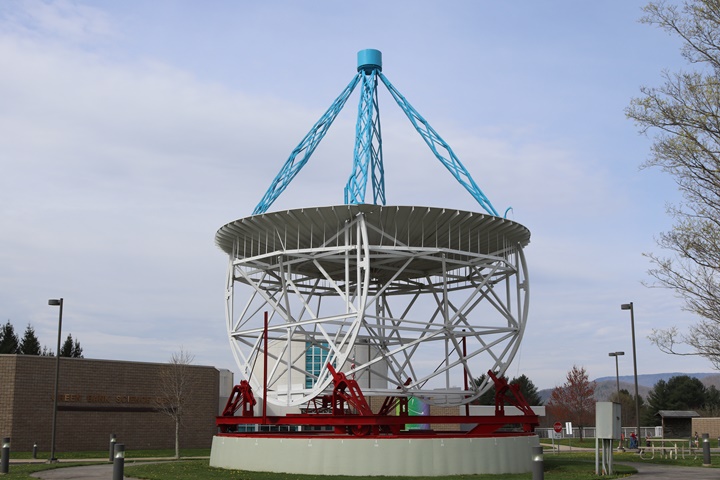
This antenna was a real surprise
for me. When Grote Reber, a radio amateur in Wheaton, IL read
about Jansky's work, he built this radio telescope in his mother's
backyard in 1937. He was the country's first radio astronomer, and
mapped the early radio waves with this original unit. In the early
1960s, Mr. Reber donated the radio telescope to Green Bank and
supervised its installation. His original radios and recording
equipment are in the museum at Green Bank.
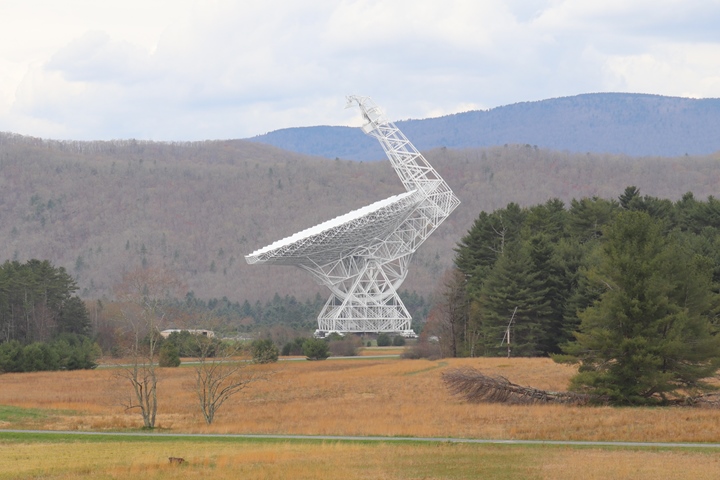
The current iteration of Mr.
Reber's radio telescope is the Green Bank Telescope. It is 100
meters in diameter and is the largest steerable radio telescope in the
world. It stands 485 feet tall, weighs 17 million pounds, and its
collecting disk is 2.3 acres in size. This photo was taken from
outside the exclusion zone at Green Bank. For those of us taking
the tour inside the exclusion zone where this and several other smaller
radio telescopes are located, we were not allowed to use our digital
cameras. We had to purchase a disposable film camera. Also,
the only vehicles allowed in the exclusion zone are powered by diesel
engines. Digital cameras and the sparkplugs in gasoline engines
generate too much electrical interference to be allowed so close to the
radio telescopes.
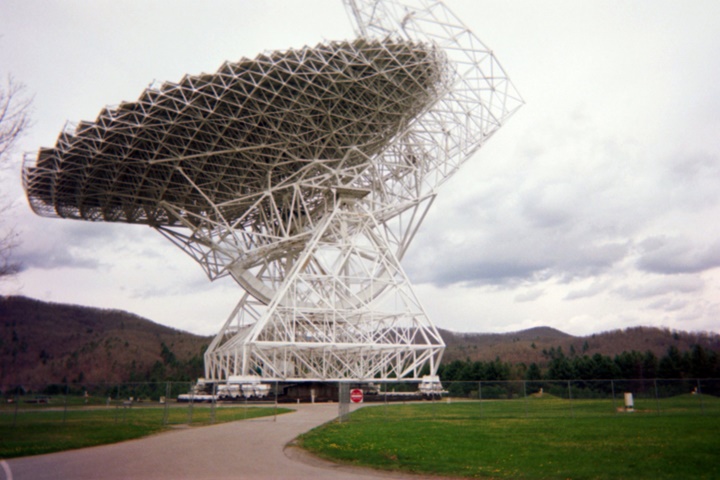
This and the next photo are from
the disposable film camera. Both photos were taken from the same
general location. Note how the antenna has moved about 180 degrees
in the 5-10 minutes the tour was at this location. The 17 million
pounds rides on sixteen steel wheels on a circular track. Four
wheels can be seen at the left corner of the base. Each wheel is
therefore carrying over a million pounds. There is no discernable
noise from the antenna as it was moving.
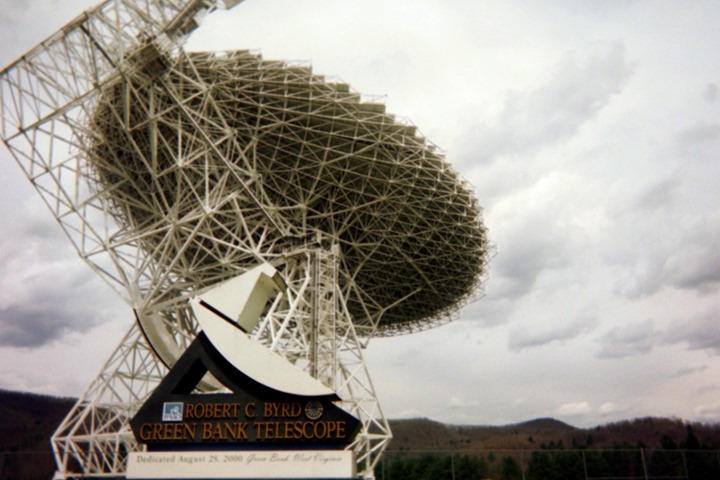
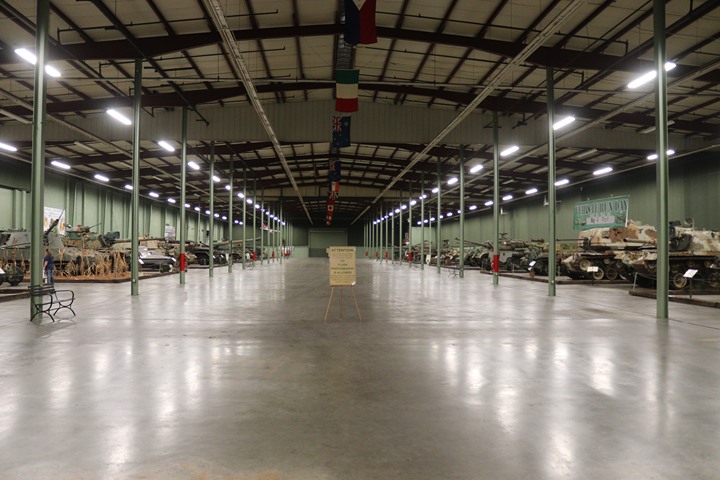
The AAF Tank Museum in Danville,
VA is one of the two largest privately owned tank and armor collections
in the U.S. This is the center exhibition hall, in what was a
factory. There are bays on either side of it, with more armored
vehicles.
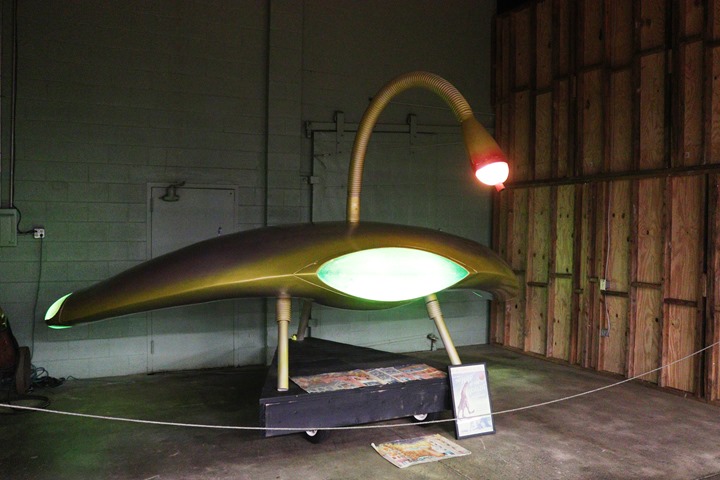
In spite of all of the excellent
armor on display, I think this prop from the 1953 motion picture "War of
the Worlds" is the coolest display in the museum.
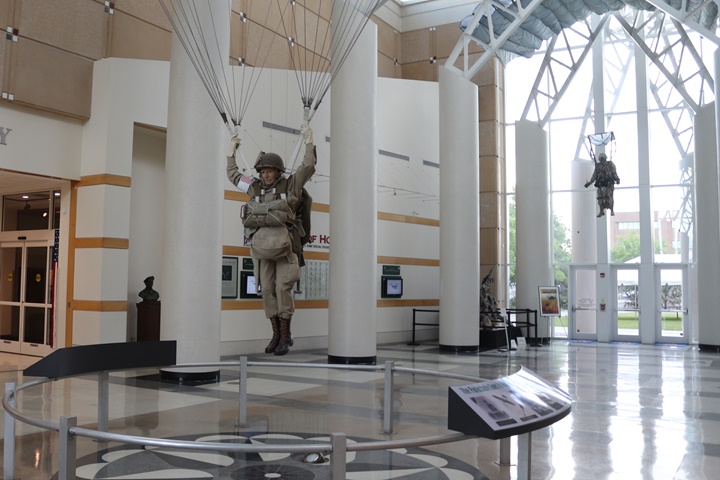
This is the main lobby of the
Airborne and Special Operations Museum in downtown Fayetteville, NC.
This should not be confused with the 82nd Airborne Museum, which is
located at nearby Fort Bragg.
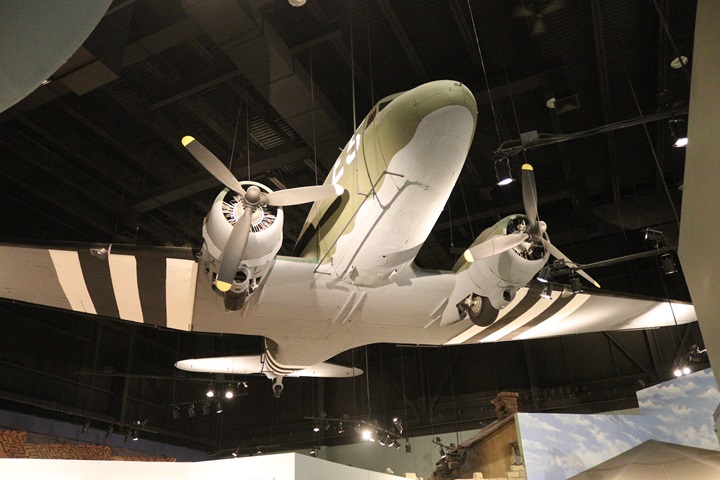
One of the many displays inside is
this C-47 that is hanging overhead in the museum. It is just one
of many outstanding displays inside the museum.
|






































